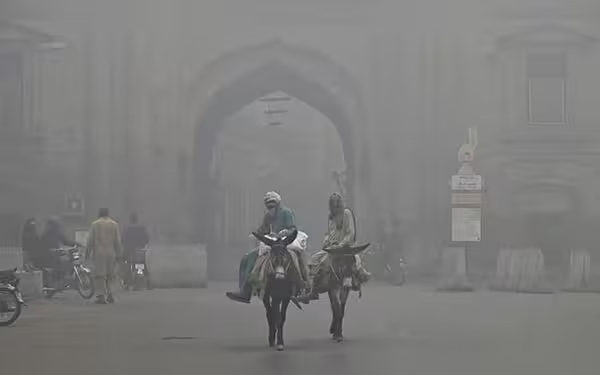Saturday, November 16, 2024 08:34 PM
Lahore's Alarming Air Quality Crisis
- Lahore ranked as world's second most polluted city.
- Toxic smog poses serious health risks to residents.
- Proactive measures needed to combat air pollution.
 Image Credits: thenews.com.pk
Image Credits: thenews.com.pkLahore has been ranked as the world's second most polluted city, facing severe health risks due to toxic smog and deteriorating air quality.
Lahore, a vibrant city known for its rich culture and history, has recently been thrust into the global spotlight for an alarming reason. According to recent reports, Lahore has been ranked as the "world's second most polluted city." This unfortunate title is attributed to the dangerously high levels of Air Quality Index (AQI) that have been recorded in the region. The AQI is a measure used to communicate how polluted the air currently is or how polluted it is forecast to become. When the AQI levels soar, it indicates hazardous air conditions that can pose serious health risks to the residents.
The situation is not unique to Lahore; other cities are also grappling with similar challenges. The prolonged period of toxic smog has created a grim reality for many, as the air quality continues to deteriorate. Residents are finding it increasingly difficult to go about their daily lives without facing the repercussions of this environmental crisis. The air is filled with harmful pollutants that can lead to respiratory issues, heart problems, and other serious health concerns.
As the smog blankets the city, it is essential to understand the factors contributing to this pollution. Industrial emissions, vehicle exhaust, and the burning of waste are significant contributors to the deteriorating air quality. Additionally, seasonal changes, particularly during the winter months, exacerbate the situation, trapping pollutants close to the ground and creating a thick haze that envelops the city.
For the residents of Lahore, the impact of this pollution is felt on multiple levels. Children, the elderly, and those with pre-existing health conditions are particularly vulnerable. Schools have reported increased absenteeism due to health issues related to poor air quality. Moreover, outdoor activities have become a rarity, as families are forced to stay indoors to avoid the harmful effects of the smog.
In light of these challenges, it is crucial for both the government and the community to take proactive measures to combat air pollution. Initiatives such as promoting public transportation, regulating industrial emissions, and increasing green spaces can play a significant role in improving air quality. Public awareness campaigns can also educate citizens about the importance of reducing their carbon footprint and adopting eco-friendly practices.
While Lahore's ranking as the "world's second most polluted city" is a cause for concern, it also serves as a wake-up call for all stakeholders involved. By working together, the government, businesses, and citizens can strive towards a cleaner and healthier environment. It is imperative that we take action now, not just for ourselves, but for future generations who deserve to breathe clean air and enjoy a better quality of life.













